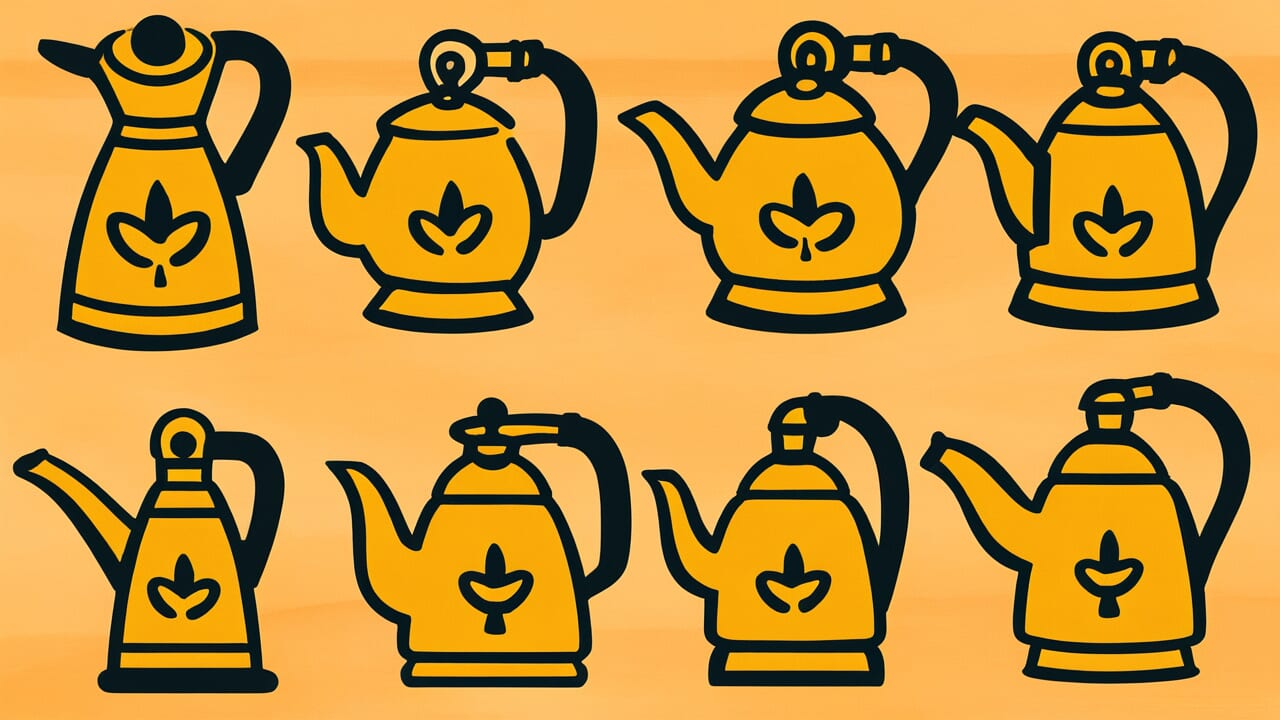How to Read “Like having seven gold tea kettles”
きんのちゃがまのななつもあるよう
Meaning of “Like having seven gold tea kettles”
This proverb mocks the foolishness of showing off wealth. You can only use one item at a time, no matter how many you own.
It points out how meaningless it is to brag about quantity.
People use this saying to criticize those who collect expensive items just to show off. It applies to anyone who hoards luxury goods without thinking about practicality.
For example, someone who buys multiple designer bags of the same brand. Or someone who displays expensive items they never use just to feel satisfied.
You can use this expression to add a touch of irony in such situations.
The proverb teaches that value comes from how you use something, not from its price or quantity.
Piling up possessions for appearances doesn’t create true wealth. This is the harsh truth it conveys.
Even today, it makes us think about the difference between material and spiritual richness. It remains a thought-provoking saying.
Origin and Etymology
No clear written records explain the origin of this proverb. However, we can make interesting observations from its components.
Let’s focus on the phrase “gold tea kettle.” Tea kettles were important tools in tea ceremony.
Those decorated with gold were extremely expensive. During the Edo period, wealthy merchants and feudal lords collected tea ceremony items as status symbols.
The key part is “having seven of them.” You only use one tea kettle at a time during a tea ceremony.
Even if you own seven gold tea kettles, you can only use one. The other six just sit in storage.
You can imagine this situation clearly.
This expression likely mocked people who owned multiple expensive items just to show off their wealth.
The number “seven” doesn’t mean exactly seven items. It often means “many” in Japanese.
Here it emphasizes excess.
This saying probably came from Edo period townspeople culture. It satirized wealthy people who ignored practicality to flaunt their possessions from a common person’s viewpoint.
Interesting Facts
Tea kettles rank among the most expensive tea ceremony items. Kettles made by master craftsmen can be worth tens of millions of yen today.
However, the spirit of tea ceremony values how you serve guests over the price of tools.
Having seven expensive tea kettles means nothing if you can’t make a heartfelt cup of tea. This essence of tea ceremony may lie behind this proverb.
The number “seven” appears often in traditional Japanese expressions. Seven Lucky Gods, seven herbs, Tanabata festival.
“Seven” symbolizes completeness and abundance. People have favored it throughout history.
In this proverb, it doesn’t mean exactly seven items. It was chosen to emphasize “many” and excess.
Usage Examples
- He keeps buying luxury watches, but it’s like having seven gold tea kettles. He always wears the same one anyway.
- She collects designer brands and shows them off, but it’s like having seven gold tea kettles. I don’t think she has anything she truly needs.
Universal Wisdom
This proverb offers deep insight into human desire and vanity. Why do people collect things they never use?
Humans naturally feel joy from “having” things. But this proverb sees through that joy as empty.
Someone with seven gold tea kettles certainly has wealth. But does that person truly live a rich life? That’s a different question.
Our ancestors understood something important. Behind collecting things lies the psychology of seeking approval from others.
The feeling of wanting to say “Look how amazing this is!” That’s a very human emotion.
But the proverb also teaches that this need for approval never gets satisfied.
Having seven or ten items never brings satisfaction. Why? Because what you really seek isn’t the objects themselves but other people’s praise.
And that praise can never fill your heart.
This proverb has been passed down for hundreds of years because human nature hasn’t changed across time.
In different forms, people still struggle with the same vanity today.
When AI Hears This
The human brain gives more weight to tangible, visible things than their actual value. Behavioral economics experiments show something interesting.
People value “100,000 yen in hand now” 1.5 to 2 times more than “100,000 yen guaranteed in one year.”
This is called the “tangibility premium.”
What makes this proverb fascinating is how it emphasizes the concrete, luxurious image of gold tea kettles with “seven of them.”
The brain responds strongly to countable concrete objects. For example, “the value of three new cars” activates the brain’s reward system more than “a happy future.”
Yet this proverb presents something so concrete, then says “there’s still something more valuable.” It maximally stimulates human cognitive bias, then denies it.
This creates a powerful structure.
Cognitive psychology tells us people undervalue abstract concepts by 30 to 50 percent on average.
Intangible values like health, trust, and knowledge get discounted because the brain finds them “hard to calculate.”
This proverb cleverly uses that cognitive distortion to teach the magnitude of invisible value. It’s an ingenious device.
Lessons for Today
This proverb teaches you the difference between “having” and “living.”
In our consumer society, we easily fall into wanting “more and more.” New smartphones, trendy clothes, the latest gadgets.
But stop and think. Does it truly enrich your life?
What matters is the ability to identify what you really need. Seven gold tea kettles can’t beat a cup of tea made with care.
The proverb reminds us of this simple truth.
You can start something today. Look around your room and check how many things you actually use.
Then, when you’re about to buy something, ask yourself these questions. “Do I really need this?” “Don’t I already have something similar?”
Reducing possessions doesn’t reduce your life. Rather, it gives you the freedom to focus on what truly matters.
What enriches your life isn’t the quantity of possessions but the quality of experiences.



Comments